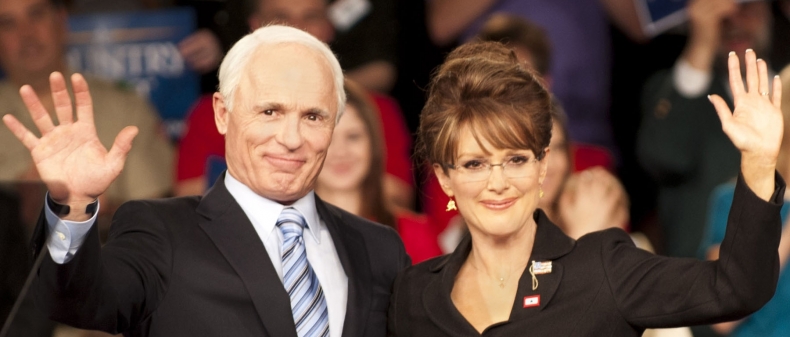
There is a fascinating moment towards the end of HBO’s recently released movie adaptation of the best selling book about the 2008 U.S. presidential election, “Game Change.” Senator John McCain (played by Ed Harris) is delivering his concession speech, congratulating Barack Obama and thanking his staff and supporters, when he acknowledges the efforts of his running mate, Sarah Palin.
Two of McCain’s closest advisors, completely exasperated by the drama that Palin brought to the campaign (and convinced that she played a major role in its downfall) have the following exchange as he speaks:
“Still think she’s fit for office?,” asks one.
“Well, who cares? In 48 hours nobody will even remember who she is.”
The audience has a different idea, however, and as the scene continues, intensifying chants of “Sarah! Sarah! Sarah!” drown out everything else. McCain’s staffers are clearly taken aback at the frenzy, and they share a bewildered look that even without words is easily translatable:
What the hell is wrong with these people?
This one moment speaks to a larger theme that helps to define the movie’s message: in making a political decision to add Palin to the Republican ticket and leverage her “hockey mom” appeal to conservative voters and women alike, the McCain campaign inadvertently changed the face of American politics by shifting the Republican party even more to the right, paving the way for the emergence of “tea party” activism and ushering in a new era of conservative anti-intellectualism.
The film perhaps exaggerates this last point. For one thing, the book upon which the movie is based (an excellent read, by the way, for those interested in a behind-the-scenes look at one of the most fascinating elections in American history), is about much more than Sarah Palin, while HBO seemingly had tunnel vision in focusing almost exclusively on the former Alaska governor. This emphasis has already given rise to chatter that the movie production was a vehicle for top aides from the McCain campaign to provide a scapegoat for their defeat.
The way that Palin (played by Julianne Moore) is portrayed also seems a little over the top. She comes off as an intellectually vapid, religious zealot who has apparently never seen a map of the world, and is always one step away from a nervous breakdown. There is no doubt that Palin remains one of the most underprepared national candidates in recent memory; her interviews with the press remain the stuff of legend, and not in a good way (as immortalized by Tina Fey’s impersonations on Saturday Night Live). Given her extraordinary success both politically and commercially, though, Sarah Palin has proven that she is no dummy.
The movie’s point about her impact on conservatism in America is a legitimate one, however. The Republican Party, which was once defined by the more pragmatic likes of Rockefeller, Nixon, Goldwater and even Ronald Reagan, is now embodied most vociferously by the Sarah Palins, Rush Limbaughs and Grover Norquists of America. More moderate voices in the party such as Arlen Specter, Michael Bloomberg and Charlie Crist have either been cast aside or have left of their own volition in recent years.
Now, as the underwhelming duo of Mitt Romney and Rick Santorum compete to see who gets to serve as the sacrificial lamb to Obama’s re-election effort, Republicans cannot agree on who should be their standard bearer. The “establishment” favors Romney, the blander but more nationally palatable option, but the right wing of the party, emboldened by the rise of Palin and the tea party, refuses to go along. The acrimony has fuelled talk of secret meetings between conservative leaders that are conspiring to derail Romney’s still-likely nomination, and even the prospect of a brokered convention.
If such a scenario were to unfold, it would make nobody happier than President Obama, who would surely benefit from Republican discord at the polls in November. In the long term, however, the result of a Republican civil war would have important consequences for the future of world affairs. American politics are inherently reactionary, and presidential elections are often more about fatigue towards one party than the merits of the other. This is why it is not inconceivable that if the Republican Party continues to shift to the right, someone like Sarah Palin could one day be elected president. Whether this would necessarily be a bad thing for the U.S. depends on your point of view, but as “Game Change” suggests, the very people who helped ignite this movement in the first place would likely be at least a little disturbed.
______
Matthew Frisch writes Foreign Desk for Toronto Standard. Follow him @mfrisch.
For more, follow us on Twitter at @TorontoStandard and subscribe to our newsletter.











